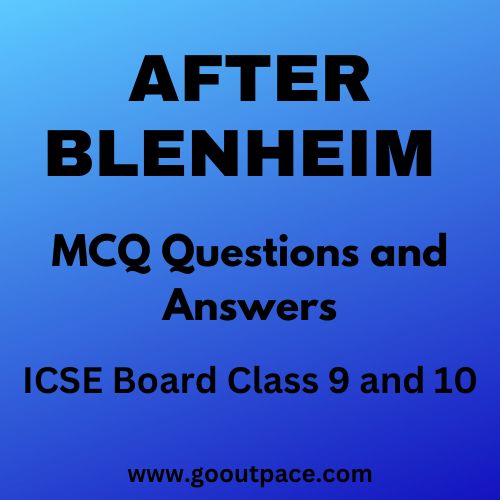You will go through MCQ Questions And Answers Of ICSE Board Class 9 and 10 AFTER BLENHEIM. Understanding a text’s entirety is very important for a learner to score better on the exam. We made Efforts to ensure thorough and proper MCQ Questions And Answers Of ICSEBoard Class 9 and 10 AFTER BLENHEIM.

1. Who is the poet?
- Robert Southey
- Roald Dahl
- Kate Chopin
- William Shakespeare
2. Who is Wilhelmine?
- Kaspar’s friend
- Kaspar’s grandchild
- Kaspar’s daughter
- Kaspar’s wife
3. What was Wilhelmine doing when Kaspar had just finished working?
- She was having chocolates
- She was reading a book
- She was playing on the field
- She was waiting for Kaspar to play with her
4. What did Peterkin find beside the stream?
- Skull of someone who had died in the war
- A wooden toy
- A colourful spherical item
- A pistol
5. What did Kaspar ironically mean by ‘great victory’?
- Sports match
- Wars and battles
- A cricket match
- The Battle of Blenheim
6. What is the meaning of ‘dwelling’ in the poem?
- Running
- House
- Humiliating
- Letting someone go
7. “Now tell us what ’twas all about”- Identify the figure of speech.
- Metaphor
- Alliteration
- Simile
- Imagery
8. “Nay… nay… my little girl, quoth he”- Identify the figure of speech.
- Metaphor
- Alliteration
- Archaism
- Imagery
9. “And by him sported on the green”- Identify the figure of speech.
- Metonymy
- Imagery
- Simile
- Antithesis
10. When was the poem written?
- 1765
- 1706
- 1770
- 1796
11. What is the central theme of the poem?
- Appreciating ones’ roots
- Love and respect towards nature
- Absurd intricacies surrounding the war which a common people are unaware of
- Nationalism and patriotism
12. “I find them in the garden”- What does ‘them’ denote in the poem?
- Beautiful roses
- Skulls of people who lost their lives in the war
- Peterkin’s toys
- Coins and jewels
13. What does the phrase “great victory” express about Kasper?
- His anger towards the administration and authorities
- His sadness for the families of soldiers who died in the war
- His pride for his granddaughter who won the dance competition
- His pride in the soldiers who sacrificed their lives in the war
14. “Now tell us what ’twas all about”- Who is he speaker?
- Peterkin
- Wilhelmine
- The poet
- Kasper
15. What did Wilhelmine and Peterkin want to know from Kasper?
- About their childhood
- About their parents
- About the war
- About the village when Kasper was young
16. What is the meaning of the term ‘rout’ in the poem?
- War
- Defeated troop
- Dying in war
- Assembly of people
17. Who won the war that Kasper was talking about?
- French
- Spanish
- Portuguese
- English
18. Why did Kasper’s father flee?
- The French soldiers burnt his home down, amongst many others
- His house was looted, and he decided to start over
- The British soldiers burnt his home down
- Kasper’s father borrowed money and could not pay it back
19. “They say it was a shocking sight”- Identify the poetic device.
- Pun
- Alliteration
- Oxymoron
- Antithesis
20. What did ‘fire’ and ‘sword’ signify?
- Human cruelty and destruction
- Warm weather
- Anger amongst the masses
- Love for fellow humans
Answers:
- A) Robert Southey.
- B) Kaspar’s grandchild.
- C) She was playing on the field.
- A) Skull of someone who had died in the war.
- D) The Battle of Blenheim.
- B) House.
- B) Alliteration.
- C) Archaism.
- A) Metonymy.
- D) 1796.
- C) Absurd intricacies surrounding the war which a common people are unaware of.
- B) Skulls of people who lost their lives in the war.
- D) His pride in the soldiers who sacrificed their lives in the war.
- A) Peterkin.
- C) About the war.
- B) Defeated troop.
- D) English.
- A) The French soldiers burnt his home down, amongst many others.
- B) Alliteration.
- A) Human cruelty and destruction.
